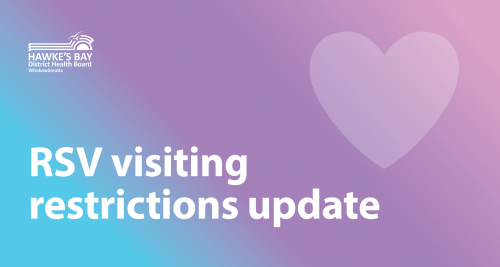
Hawke’s Bay Hospital has updated its visitor policy to not allow children under 16 to visit as presentations to hospital of people with RSV increase.
Chief Medical and Dental officer Dr Whyman said to protect healthy children from catching RSV, (respiratory syncytial virus), from people in hospital they wouldn’t be allowed to visit unless there were exceptional circumstances or a clear medical need.
Hawke’s Bay Hospital has also put in place a no-visitor policy for ward A1 , where there were 24 adult patients with RSV.
The children’s ward, special care baby unit (SCBU), maternity units at Hawke’s Bay Hospital and Wairoa also remained closed to visitors.
Chief Medical and Dental Officer Robin Whyman said there had been a continued and steady increase of adults with RSV needing hospital care over the past week, and the district health board expected to see that continue for at least another week.
Staffing of the hospital continued to be impacted and the district health board was calling in all casual staff to support the busy wards and acute areas, Dr Whyman said.
Four elective surgeries had also been postponed today. “We are doing our best to postpone as few electives as possible and are reviewing the situation daily,” Dr Whyman said.
Dr Whyman said he understood urgent care and general practices continued to be busy but it was important for people who were sick and progressively getting worse to get medical help early, to help prevent a hospital admission.
“It’s very important that parents and caregivers keep children warm and at home and away from other children if they are sick. Children who had younger siblings or babies at home should be kept away from early childcare centres and kōhanga reo, where possible.
“The hand-washing, self-isolation and social distancing families followed so well during last year’s COVID-19 lockdown are a good guide to the care we need to control this RSV outbreak,” he said.
Pauses with breathing can be a symptom of severe RSV illness in babies and signs of this, especially in the very young meant they should be seen by a doctor urgently. People should also check in on older neighbours, friends and family to check they were okay.
Signs of when to seek medical attention urgently in children:
- Audible wheezing sounds
- Breathing very fast
- Laboured breathing — the ribs seem to suck inward when the child breathes in
- Seems very unwell
- Sluggish or lethargic.
More information about RSV can be found on the dedicated page here.
Further information and resources
Download our RSV information sheet
Ministry of Health information on RSV
Kidshealth information: signs your child is struggling to breathe
Health Navigator information about RSV
If you are concerned about your baby seek advice from your GP or call Healthline for free health advice on 0800 611 116 - anytime 24/7.
If it’s an emergency – call 111.






Post your comment
Comments
No one has commented on this page yet.